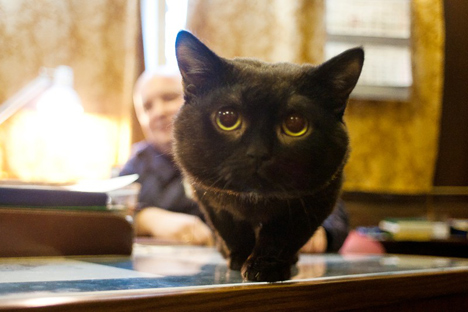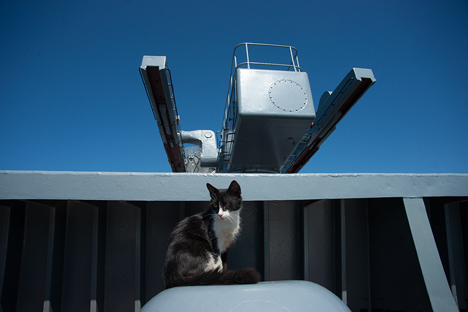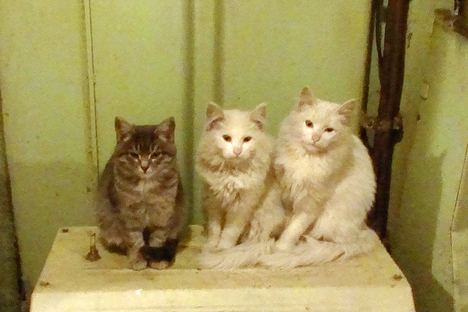Bears, cats, rats: all paws on deck on Russian ships

Botsman is serving on the nuclear-powered cruiser Kirov in Severodvinsk. Source: Oleg Kuleshov
Cats
Few people are aware that two crews actually co-exist on board most Russian navy ships; one made up of seamen and the other of “sea kittens.” Each crew has its own set of responsibilities: The seamen control the ship and its systems, while superstition would have us believe that cats bring luck, alert ships about impending storms and generally predict the weather.
Cats have been serving aboard ships for hundreds of years and are full-fledged members of the crew, often receiving awards and medals, and even monuments. Cats have been an essential part of most ships for as long as sailors.
The number of sea kittens is usually limited by the size of the ship. On the Russian aircraft carrier Admiral Kuznetsov, for example, it is impossible to gauge the size of the feline population, while on the small antisubmarine vessel Onega there is only one sea kitten.

A cat from the Kerch missile cruiser, Black Sea fleet, Sevastopol. Source: Oleg Kuleshov
The most famous feline member of the Russian Navy is a cat called Botsman, who is serving on board the nuclear-powered cruiser Kirov (Project 1144). He carries out the commander's orders irreproachably, and regularly undergoes enhanced training, with the help of a laser pointer.
He has several furry mariners under his supervision, each of whom has his own responsibilities; some on duty on the gangway, memorizing faces of those walking past, while others serve at the large mess room, attentively studying those entering.
As reward for good service, Botsman is allowed to take a walk in the Zvezdochka shipyard at Severodvinsk.
Cats also live in submarines. They do not have much work there, since submarines do not have rats to catch. However, they form an excellent means of relaxation for the seamen. Their purring and graceful movements have a calming effect. Also, according to the human crew, cats in a submarine are better than any gas detector.
A cat from the TK-13 Project 941 submarine, which was waiting for dispatch on a mission, would reportedly come to the central post for his watch every evening at 20:00 hrs carrying a dead rat, deposit it by the orderly's chair, and leave.

Cats from the Kirov nuclear-powered missile cruiser, Northern Sea fleet, Severodvinsk. Source: Oleg Kuleshov
Of all the animals aboard Russian ships, cats occupy a special place, though other animals like dogs, birds, rats and even bears have been known to keep mariners company.
Rats
Rats are a headache for captains who do not like cats. If there are no cats there are rats. But there are also good, domesticated rats like Larisa, from the Project 58 missile carrier Admiral Golovko, who became the darling of the vessel’s crew. The ship no longer exists, but everyone from its crew remembers her story.
Bears
Though difficult to imagine, there were bears in the navy until the 1950s. This tradition existed from the pre-revolutionary era, because the bear has always embodied Russia's spirit and power. At first glance the animal is peaceful, even indolent, but it is also capable of swiftly changing to attack mode and tearing to pieces anyone who threatens it.
Domesticated bears have lived near people for long periods, performing various tricks and becoming the favourite performers for entire regiments and ships. After the revolution many traditions were forgotten or dropped, but the custom of having a talisman aboard a ship was preserved. However, the tradition of keeping a bear on a ship has now been abandoned and they are not permitted to go on board.
All rights reserved by Rossiyskaya Gazeta.
Subscribe
to our newsletter!
Get the week's best stories straight to your inbox